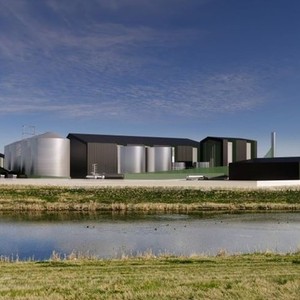GIP receives land use approval for RNG, ethanol project

SOURCE: Green Impact Partners
January 25, 2023
BY Green Impact Partners Inc.
Green Impact Partners is pleased to announce the Future Energy Park has received final land use approval from the City of Calgary municipal council. The approval lays the groundwork from a local planning perspective and represents a major approval for the project. Located within the City of Calgary, Future Energy Park is a proposed net CO2 negative biofuels facility using non-food grade waste-wheat to produce renewable natural gas (RNG) and ethanol.
“Working with the mayor and city council in achieving this critical path milestone gives us confidence we will be able to break ground in 2023, subject to the receipt of other major approvals,” said Jesse Douglas, CEO. “We are thrilled and especially thankful to the City of Calgary for their collaborative and constructive approach. The environmental benefits of this project are matched with significant direct benefits to Calgary and the Province of Alberta through job creation and economic growth in the clean technology sector.”
“The Future Energy Park is a big win for Calgary and for the region. It represents a significant investment in our city that integrates the agricultural and energy sectors to produce biofuels locally,” said Mayor Jyoti Gondek. “I’m pleased to see Green Impact Partners bring this exciting project to Calgary, contributing to our economic diversification and environmental sustainability goals.”
The Future Energy Park is an innovative, clean energy project which is forging a new path between Alberta’s energy and agriculture sectors. This project represents an approximate $1.2 billion investment in Alberta and the City of Calgary. Once operational, the facility is expected to produce approximately 3.5 million MMBtu per year of RNG, over 300 million liters of ethanol annually, approximately 235,000 metric tons of cattle feed annually, and create carbon credits.
Subject to receipt of final regulatory approvals, Green Impact Partners is targeting completion in 2025.
Advertisement
About the future energy park facility
The project will create approximately 800 jobs over 24 months during construction and 50 jobs during operations.
The facility will generate income tax revenue of $50 million per year ($1.2 billion over the first 20 years).
Once operational, the Future Energy Park will provide annual new, direct revenue of over $150 million to rural wheat producers.
Advertisement
Green Impact Partners will be using local engineering, construction, and environmental firms for the project.
The proposed facility is being sited in an industrial area in southeast Calgary and will be constructed and operated on 52 acres of land which has been designated for industrial use.
With a carbon intensity score of -20, the Future Energy Park is expected to be North America’s largest carbon negative energy facility.
Related Stories
The Michigan Advanced Biofuels Coalition and Green Marine are partnering to accelerating adoption of sustainable biofuels to improve air quality and reduce GHG emissions in Michigan and across the Great Lakes and St. Lawrence Seaway.
The USDA reduced its outlook for 2024-’25 soybean oil use in biofuel production in its latest World Agricultural Supply and Demand Estimates report, released April 10. The outlook for soybean oil pricing was revised up.
EIA reduces production forecasts for biobased diesel, increases forecast for other fuels, including SAF
The U.S. Energy Information Administration reduced its 2025 forecasts for renewable diesel and biodiesel in its latest Short-Term Energy Outlook, released April 10. The outlook for “other biofuel” production, which includes SAF, was raised.
FutureFuel Corp. on March 26 announced the restart of its 59 MMgy biodiesel plant in Batesville, Arkansas. The company’s annual report, released April 4, indicates biodiesel production was down 24% last year when compared to 2023.
Neste has started producing SAF at its renewable products refinery in Rotterdam. The refinery has been modified to enable Neste to produce up to 500,000 tons of SAF per year. Neste’s global SAF production capacity is now 1.5 million tons.
Upcoming Events










